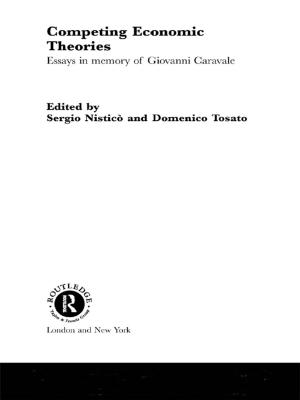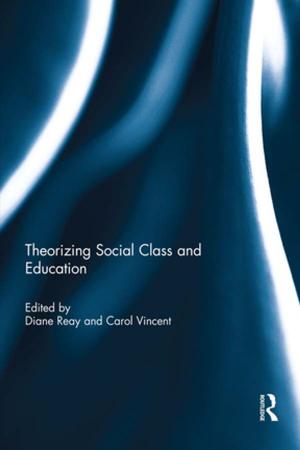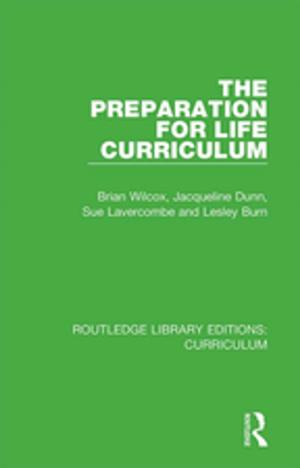Schooling, the Puritan Imperative, and the Molding of an American National Identity
Education's "Errand Into the Wilderness"
Nonfiction, Reference & Language, Education & Teaching, Educational Theory, Curricula| Author: | Douglas McKnight | ISBN: | 9781135631062 |
| Publisher: | Taylor and Francis | Publication: | May 14, 2003 |
| Imprint: | Routledge | Language: | English |
| Author: | Douglas McKnight |
| ISBN: | 9781135631062 |
| Publisher: | Taylor and Francis |
| Publication: | May 14, 2003 |
| Imprint: | Routledge |
| Language: | English |
Present-day America is perceived by many as immersed in a moral crisis, with national identity fractured and uncertainty and anxiety about the future. Public schools in this country are, historically and still today, the major institution charged with preserving and teaching the symbols of national identity and a morality that is the concrete expression of those symbols and the ideas for which they stand. A widespread belief is that only through schooling can America be saved from the current "crisis," but the schools have failed in this mission and must be reformed.
In this book, Douglas McKnight develops a historical interpretation of how the New England Puritans generated a powerful belief system and set of symbols that have fed American identity and contributed to preserving and perpetuating it into the present time. He explores the relationship between the purposes of education (and how this term has shifted in meaning) and the notion of an American identity and morality--rooted in the Puritan concept of an "errand into the wilderness"--that serves a particular sacred/secular purpose. The phrase "errand into the wilderness" is taken from a 1956 book by Perry Miller with this title, where it refers to the Puritan dream of creating a city in the wilderness (the North American Colonies) that would be a utopian community--a beacon for the rest of the world for how to organize and live in the ideal religious community.
Highly pertinent to the current debate about the purposes and crisis in education and in America, morality in schools, the cultural function of education, the changing nature of the language of education, the complex relation of schooling and national identity, this book explicates these elements within the American psyche by exploring the effects of the Puritan "symbolic narrative" at three different points in American history: Puritans during the 1600s and 1700s; the Gilded Age, when the urban Protestant middle class ascended to cultural dominance; and the present age.
Schooling, the Puritan Imperative, and the Molding of an American National Identity: Education's "Errand Into the Wilderness" makes an important contribution to the fields of curriculum studies and the history of education. It will interest students and scholars in these fields, as well as those in educational philosophy, religion and education, intellectual and social history, and American studies.
Present-day America is perceived by many as immersed in a moral crisis, with national identity fractured and uncertainty and anxiety about the future. Public schools in this country are, historically and still today, the major institution charged with preserving and teaching the symbols of national identity and a morality that is the concrete expression of those symbols and the ideas for which they stand. A widespread belief is that only through schooling can America be saved from the current "crisis," but the schools have failed in this mission and must be reformed.
In this book, Douglas McKnight develops a historical interpretation of how the New England Puritans generated a powerful belief system and set of symbols that have fed American identity and contributed to preserving and perpetuating it into the present time. He explores the relationship between the purposes of education (and how this term has shifted in meaning) and the notion of an American identity and morality--rooted in the Puritan concept of an "errand into the wilderness"--that serves a particular sacred/secular purpose. The phrase "errand into the wilderness" is taken from a 1956 book by Perry Miller with this title, where it refers to the Puritan dream of creating a city in the wilderness (the North American Colonies) that would be a utopian community--a beacon for the rest of the world for how to organize and live in the ideal religious community.
Highly pertinent to the current debate about the purposes and crisis in education and in America, morality in schools, the cultural function of education, the changing nature of the language of education, the complex relation of schooling and national identity, this book explicates these elements within the American psyche by exploring the effects of the Puritan "symbolic narrative" at three different points in American history: Puritans during the 1600s and 1700s; the Gilded Age, when the urban Protestant middle class ascended to cultural dominance; and the present age.
Schooling, the Puritan Imperative, and the Molding of an American National Identity: Education's "Errand Into the Wilderness" makes an important contribution to the fields of curriculum studies and the history of education. It will interest students and scholars in these fields, as well as those in educational philosophy, religion and education, intellectual and social history, and American studies.















